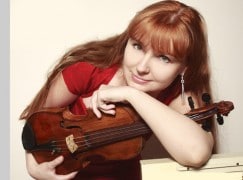The long-awaited album by offbeat violinist Anna Karkowska is ready to ship. The website‘s running, there’s a new video clip and record critics everywhere are undergoing advanced neurological tests before addressing their reviews.
So confident is the artist that you’re going to love her work, she has posted this on the website:
We do NOT accept any returns or exchanges so please make sure to listen to our music samples available on line first before ordering. In case of a lost or damaged package please contact your carrier directly.


